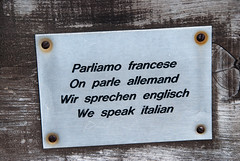I love languages. I have a Bachelor’s in Linguistics, which entailed a minor in Spanish. For my last MS, I’ve taken Irish lessons online. In my current WIP, I have a Russian Soviet trilingual heroine who doesn’t want our American monolingual hero to know she speaks English. Oh, and it’s set in Paris. Hooray! (For some reason, it’s always my heroines that are the polyglots.)
It’s only natural that I run into language issues. (And/or give myself language issues.) So when Theresa Stevens posted about using foreign languages in English works today, I started to comment. . . . Halfway through my novella comment, I decided it might be better just to blog about it myself.
I think Theresa has some great guidelines for foreign language usage:
- Length. Shorter bits are easier to absorb than longer ones.
- Frequency. A once-in-a-while [words] will go down easier than long dialogue exchanges.
- Familiarity. Some foreign words are just better known that others. If an Italian guy says, “Salut,” we probably all know what that means. But how many of you can parse a Polish guy saying, “Dziekuje”?
- Common roots. Some words appear similar to their English counterparts because of shared linguistic roots. . . . So when Edith Piaf belts out, “Je ne regrette rien,” a mindful reader will see “regrette” and recognize it as a fancified version of “regret.”
 I tend to think that dialogue and narration use slightly different solutions for the same issue. Here’s what I think is working for me (but I’m sure my CPs will have their own opinions when I let them read my WIP!).
I tend to think that dialogue and narration use slightly different solutions for the same issue. Here’s what I think is working for me (but I’m sure my CPs will have their own opinions when I let them read my WIP!).
Dialogue
In my WIP when I’m in his POV, I figure the foreign language is pretty much incomprehensible to him (and my readers), I don’t write out the full Russian or French. I have been making exceptions like the above: if it’s very, very short (Eto Lissa), common (oui), or homophonic (téléphone). I figure anything longer/less common is just a wall-o-sound to him—he can’t distinguish the words or even phonemes. (Think about what it’s like to tune in to a Spanish channel. I speak Spanish and it still takes me a minute to “code switch,” as we call it in linguistics.)
I tend to summarize the foreign language dialogue in his POV. It’s a bit harder in her POV, since she’d understand any of the three languages. Here, I do another thing Theresa mentions: trying to make it obvious from the context. For example:
[They’ve just gotten out of a car.]
“Mademoiselle?” the driver called. I turned back. He stood by the still-open car door, holding my father’/s brown leather briefcase aloft. “Votre mallette?”
Of course, if both characters are speaking Russian (and no one else is around), I just write it in English. I do take a look at the syntax and vocabulary of Russian, but I wouldn’t change either of those aspects to make the English weird or unintelligible.
Narration
In internal monologue, I use English as well, of course, and again, wouldn’t change the syntax or vocabulary too drastically. I actually think this can actually be more loyal to the character’s voice, and I’ve commented on why before (but I’ll repeat it here).
I think it’s entirely possible to stay true to a character’s voice without actually phrasing things the exact way their thoughts might translate. A “character’s voice” is already an artificial construct. Most people actually think in pictures, not words. And if my character is a native-born Russian, she probably thinks in Russian. Russian pictures != marketable English-language novel. Translating thoughts into words and Russian words into English ones is, I think, a bigger change than rephrasing said thoughts in English.
For example, in Russian, the stressed element of a sentence is at the beginning (“To the store I went” isn’t odd, just emphatic), but that wouldn’t convey the meaning well in English. Or, for example, if the Russian character thought “nose has not grown,” a Russian idiom, the English reader would be just as confused as we all are now. (No idea what it means.)
It’s more loyal to the character’s voice to make sure that their thoughts are as eloquently expressed (or not) in English as they would have been in their native language—and that’s pretty much always going to require some rephrasing.
What do you think? How would you convey a foreign language in narration and dialogue?
Photo by Eric Andresen
